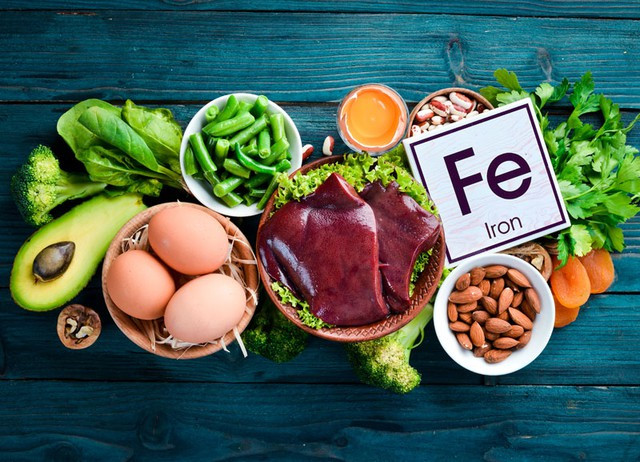8 foods rich in vitamins and minerals good for women
For women, pregnancy, childbirth or age make the body susceptible to deficiencies in essential vitamins and minerals.
1. Important nutrients that women are prone to deficiency
Despite having a normal diet, due to the biological characteristics of the female body such as pregnancy, childbirth, breastfeeding, blood loss (due to menstruation), low bone density, etc., they are always at high risk of lacking essential vitamins and minerals.
Besides biological factors of the body, the reason why women are susceptible to malnutrition is because they often apply strict diets to lose weight, eat vegetarian food...
Research shows that up to 30% of women are deficient in many important vitamins and minerals, and this risk increases with age. The most important nutrients that women are most likely to be deficient in are vitamins A, B, C, D, E, etc.; minerals such as iron, calcium, magnesium, etc. Long-term deficiency of these nutrients causes women's bodies to become weak, tired, lose hair, have cramps, and have aching bones and joints, etc.

2. Some foods rich in vitamins and minerals that women need to supplement2.1. Foods rich in vitamin A
Vitamin A plays an important role in maintaining vision, nerve function, healthy skin, and a woman's endocrine/reproductive health, and supports the lungs, liver, kidneys, and digestive organs.
Because the body cannot synthesize vitamin A, the safest and most effective way for women to supplement is to use foods rich in vitamin A in their daily meals.
Vitamin A is found in foods of animal origin such as: eggs, milk, fish, meat, pork liver, testicles, shrimp...; Foods of plant origin such as: dark green vegetables (malabar spinach, water spinach, amaranth, squash...); yellow fruits and vegetables (gac fruit, carrots, pumpkin, papaya, mango...).
2.2. Foods rich in vitamin B
B vitamins, including folate, are important for a woman's metabolism, preventing fatigue, enhancing cognitive function, and are especially essential for a healthy pregnancy.
Women should get vitamin B from animal sources such as eggs, fish, meat, milk and yogurt. Plant sources include spinach and green leafy vegetables, asparagus, citrus fruits, melons and beans.
Older women, people with anemia, and vegetarians should see a nutritionist for dietary advice and appropriate supplements to ensure adequate vitamin B intake, as they are at highest risk of deficiency.
2.3. Foods rich in vitamin C
Vitamin C acts as an antioxidant to neutralize free radicals and reduce the risk of inflammation and disease. Vitamin C is also thought to help slow down skin aging and may also protect against skin damage and free radical formation caused by UV exposure.
Studies also show the potential of vitamin C in promoting collagen formation, which helps maintain the health, firmness, and elasticity of women's skin.
Therefore, women should try to prioritize choosing foods rich in vitamin C in their diet such as: broccoli, tomatoes, orange bell peppers, guava, kiwi, strawberries...
2.4. Foods rich in vitamin D
According to Dr. Phan Bich Nga, National Institute of Nutrition, vitamin D plays a very important role in bone development. Vitamin D deficiency can affect the absorption of minerals necessary for bones such as calcium and phosphorus, thereby increasing the risk of bone-related problems.
Additionally, women who are milk intolerant or do not eat milk, eggs, and fish or who eat a vegan diet are at higher risk of vitamin D deficiency.
In addition to regular exposure to sunlight to promote the body's production of vitamin D, vitamin D sources also come from some foods such as sea fish, liver, chicken eggs... and some foods supplemented with vitamin D such as milk, cooking oil, cereals...
2.5. Foods rich in vitamin E
The positive effects of vitamin E include its ability to support the proper functioning of many organs, enzyme activity, and neurological processes. Additionally, it can help balance cholesterol, repair damaged skin, thicken hair, and balance hormones.
Some foods rich in natural vitamin E are: butter, meat, fish, milk, green vegetables, almonds, soybeans...
2.6. Foods rich in iron
Iron deficiency and iron deficiency anemia are the most common nutritional deficiencies worldwide, especially in young women.
Adolescent girls are at the highest risk of iron deficiency and women in general need to be careful to get enough iron as iron requirements increase during menstruation due to blood loss. It has been found that globally around 50% of pregnant women have very low iron levels leading to anaemia.
Women need to be provided with adequate iron and vitamin B12 to prevent anemia, fatigue and enhance immunity. Food sources rich in iron include: red meat, beans, egg yolks, whole grain products, nuts and seafood...

2.7. Foods rich in calcium
Getting enough calcium is important for bone strength, but it's also important for regulating heart rhythm, supporting muscle function, controlling blood pressure and cholesterol levels, and many other functions related to nerve signaling.
Calcium, when consumed along with other important nutrients like vitamin D and magnesium, has been shown to protect against some of the biggest threats to women's health like heart disease, osteoporosis, diabetes and cancer.
Therefore, in addition to the necessary nutrient groups, in the daily menu, women should prioritize adding foods rich in calcium such as: shrimp, crab, fish, snails, sesame, soybeans, wood ear mushrooms, spinach, eggs (especially egg yolks), milk and dairy products...
2.8. Foods rich in magnesium
Magnesium is one of the most important minerals in the body, but it is also one of the most commonly deficient. Leg cramps, insomnia, muscle spasms, anxiety, headaches, and digestive problems like constipation can all be signs of magnesium deficiency. The risk of deficiency may be even greater in older women.
Although there are many products that help supplement magnesium, nutritionists recommend that we supplement magnesium-rich foods through our daily diet.
According to the recommendations of the National Institute of Nutrition, women's daily magnesium needs are 270-290mg/day. To get enough magnesium, women should choose foods such as: seafood, meat, dark green leafy vegetables, beans, sesame, peanuts, whole grains, nuts...
